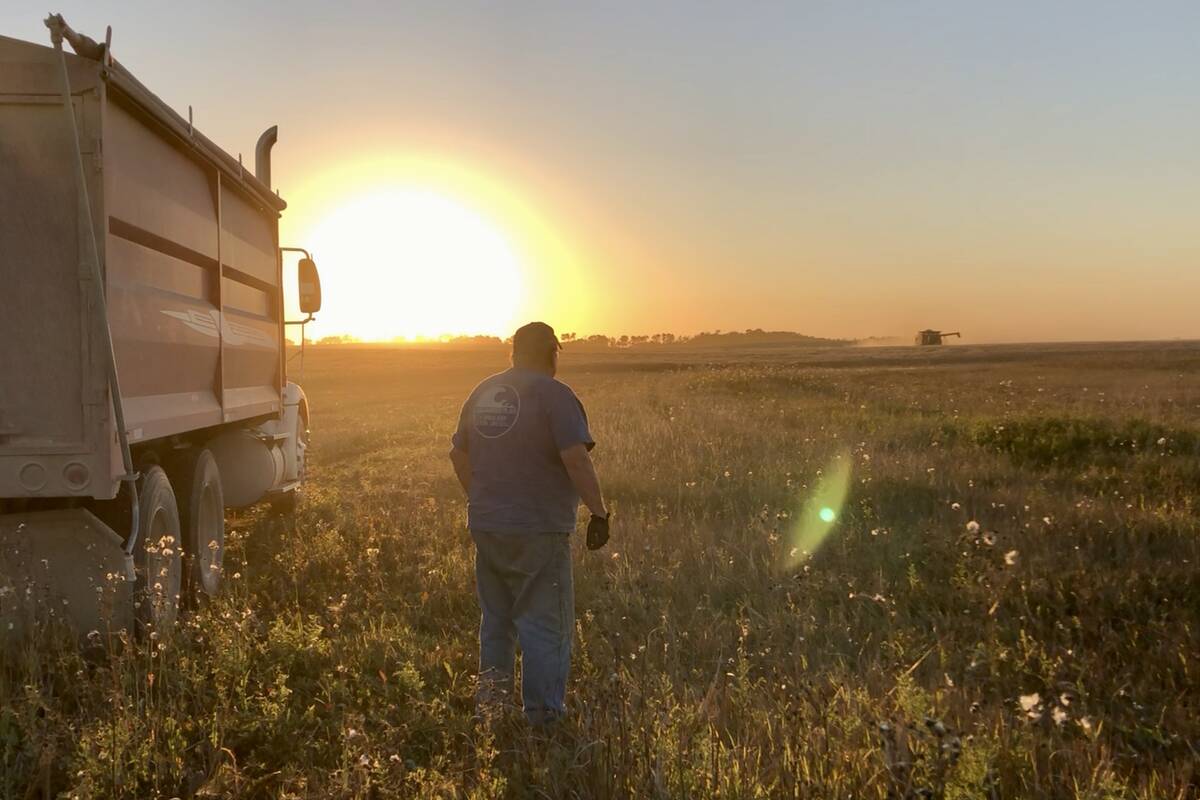Dear TEAM: For a few years now we have been told by nutritionists not to eat raw eggs. Could you please set the record straight for me and all your readers? Is it or is it not OK to eat raw eggs? – J.T., Foam Lake, Sask.
In my last article, I submitted a drumstick dessert that called for eggs. The dessert is an uncooked freezer dessert. We received the above query from a reader and thought it would be a good idea to address this issue.
Read Also

VIDEO: Bittersweet harvest for this family farmhand
Bruce Burnett helps his brother harvest wheat and canola for the last time on the family farm in Manitoba where they both grew up.
I called Brenda White, home economist and communications manager with the Alberta Egg Producers Board. She said the bottom line is that if eggs are handled and consumed safely, then eating raw Canadian eggs will not pose a food safety risk.
“The fear around raw eggs has originated from media reports over the years in other countries such as Europe and the U.S., where food safety is not as rigorous on farm through to retail level.”
For more information on eggs check out www.eggs.ab.ca or contact Brenda White, #15 Ð 1915 Ð 32 Ave. N.E., Calgary, T2E 7C8, phone 403-250-1197 ext. 26, fax 403-291-9216 or e-mail whitebj@telusplanet.net. She gave us the following information that is also available from the Food Safety Info Line that serves British Columbia and Manitoba at 800-892-8333.
Q: Is it OK to use raw or partially cooked eggs in recipes?
A: When preparing raw or lightly cooked eggs, for example in eggnog or Caesar salad, follow proper food handling methods. Use only Grade A eggs that have been refrigerated. Grade A eggs must have clean, uncracked shells. Wash hands in hot, soapy water before and after handling the eggs.
Eat the dish immediately after preparation or immediately refrigerate the product until served, keep it cold during serving and consume it the same day it is prepared. Discard leftovers.
The following information comes from Canadian Egg Marketing Agency at www.canadaegg.ca.
Q: How can I prepare eggs safely?
A: Eggs are a versatile and economical part of any meal. Like meat, milk, fish and other perishable foods, they can be enjoyed without safety concerns when properly handled.
* Wash hands, utensils, equipment and work areas with hot, soapy water before and after food preparation.
* Wash containers and utensils that have been used for a raw-egg mixture before re-using – even for another raw egg mixture.
* When refrigerating a large amount of hot egg-rich food or leftovers, divide it into several shallow containers to ensure rapid cooling.
* When hosting a party or get-together, serve all egg dishes within two hours. Keep hot egg dishes hot above 140 F (60 C) and cold egg dishes cold below 40 F (4 C).
For more information and food safety tips, visit www.canfightbac.org.
Q:Can I freeze eggs?
A:Yes. Raw eggs can be frozen at 0 F (-18 C) and should be used within four months. Freeze eggs in small quantities and defrost only what you need. An easy way to freeze eggs is to put them in an ice-cube tray. When frozen, transfer the eggs to a freezer container and label. As with any frozen foods, it is best to thaw eggs in the refrigerator and use them as soon as they are thawed. Only use thawed eggs in dishes that will be thoroughly cooked.
* Egg whites can be frozen “as is.” Pour them into freezer container, leaving room for expansion, seal tightly, and label with the number of egg whites and the date and freeze. Substitute two tablespoons (30 mL) thawed egg white for one large egg white.
* For whole eggs or yolks, beat until just blended. Pour into a freezer container, seal tightly, label with the number of eggs and the date. Substitute three tablespoons (45 mL) thawed whole egg for one large fresh egg.
* Egg yolks will thicken when frozen. To prevent lumpiness in the yolk, beat in either 1/8 teaspoon ( 1/2 mL) salt or 11/2 teaspoons (7 mL) sugar or corn syrup per 1/4 cup (50 mL) egg yolks (about four yolks). Label with the number of yolks, the date and whether you added salt for main dishes or sugar for desserts or baking. Substitute one tablespoon (15 mL) thawed yolk for one large fresh yolk.
* Hard-cooked eggs do not freeze successfully, as cooked egg whites will become tough and rubbery.
Holiday recipe and/or craft contest
Send your favourite Christmas recipe or craft to: TEAM Resources contest at The Western Producer, Box 2500, Saskatoon, Sask. S7K 2C4. Deadline for entries is Dec. 3.
The recipe could be an appetizer, punch, salad, main dish, bread, dessert, Christmas candy or baking. The craft should be easy to make and something all members of a family could participate in.
A draw will be made from all the entries received and a prize of an ATCO Blue Flame Kitchen Holiday Cookbook sent to a recipe entry and a craft entry. The winning entries will be printed in a future issue of the paper.
Three conferences for farmers
As chair of the Agriculture Institute of Management in Saskatchewan, I am happy to say this year we are sponsoring 15 farmers to attend the Agribusiness Management Development Program. AIMS will sponsor farm operators to receive up to $1,750, to cover tuition, travel and accommodation expenses for participation in the program. This year’s event will be held at the Saskatoon Inn, Jan. 27-Feb. 2, 2002.
We are looking for participants who are actively involved in farming and can benefit from this opportunity to enhance management skills. Preference will be given to those applicants who demonstrate that they bring a range of experience and ideas and can contribute to group discussions, thereby enhancing the learning experience for themselves and others. We hope to have representation from all regions of the province and all commodity groups. Interested farmers should apply to Brenda Stefanson, program manager, AIMS, 306-975-8927, fax: 306-975-8929 or visit www.sccd.sk.ca/aims.
Other conferences
Excellence in Agriculture, 2001 is the Canadian Farm Business Management Council conference coming up Nov. 29-Dec. 1 in Mont Tremblant, Que. Among the subjects are strategic planning, global changes in agriculture, communication geared toward solutions, leadership, consolidation of the food industry, life sciences: the new green revolution and agriculture for non-food purposes.
For more info, contact Gail Vent at 888-232-3262, ext. 26.
On Feb. 7- 8, at the Saskatoon Inn in Saskatoon, farmers will be attending the Profiting from Agricultural Change conference. Topics this year include:
* Preparing Yourself for the Possibilities, Brent Van Koughnett, Agri Skills Inc.
* Passion, Entrepreneurship and the Rebirth of Rural Economics, Ernesto Sirolli from the Sirolli Institute.
* Tapping into Agri-Tourism Opportunities with Claude-Jean Harel, Great Excursions.
* Marketing GM Wheat – Can it be done? with Patty Rosher from the Canadian Wheat Board.
* Market Outlooks for Livestock, Organic Grains and Pulses.
* Finding Opportunities Within the New Economy, Tom Allen, University of Saskatchewan.
* The Aboriginal Agriculture Strategy, Lester Lafond, Lafond Financial Inc.
* Managing Change, The Human Side of Farming, David Irvine.
* The Duality and Regionality of Canadian Agriculture Policy, Bill Martin, U of S.
* Unearthing and Developing our Entrepreneurial Skills, Pauline Molder, U of S.
* Consumer Trends Affecting Production, I’ll Have What She’s Having, Judy Schultz, food writer, Edmonton Journal
* Panel Discussion – High Tech Production vs. Low Tech Production: Martin Entz, U of Manitoba, Len Piggott, holistic management consultant, Dennis McIntosh, precision farmer and Ron Palmer, U of Regina.
















